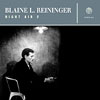BLAINE L. REININGER, "NIGHT AIR 2"
LTM
 The songs on Night Air 2evoke the experience of walking across wet cobblestones slick withrain, ducking under awnings of sidewalk cafes and antiquarianbookstores, aimless and anonymous in an unfamiliar city at night.Blaine L. Reininger, a native of Colorado who has lived in Europe sincethe early 1980s, draws heavily upon his expatriate sense ofisolation—geographic, linguistic and emotional—to create an articulatesuite of mature pop songs. Most will know Reininger from his more than20-year stint as frontman for the intermittently brilliant groupTuxedomoon, creators of Half-Mute, Desire and handful ofessential art-punk classics. In the long gaps between the group'speriods of activity, Reininger has pursued a fruitful solo career,releasing a string of baroque pop albums highlighting his talent as amulti-instrumentalist and witty lyricist. This album is billed as asequel to 1984's Night Air, but that's a bit misleading, as itwould be more aptly described as a best-of, consisting of 15hand-picked tracks from albums and soundtracks recorded between 1989and 1999. All of this material has been available previously, but invery rare pressings on Belgium's Crepuscule and other small Europeanlabels. As he has done on so many Tuxedomoon releases, Reininger playsviolin and viola throughout Night Air 2, building each songfrom multi-tracked layers of dark, swooning strings. The rest of thesound is filled out with an assortment of synthesizers, keyboards andrhythm boxes, adding up to an urbane, metropolitan sound that matchesthe sophistication of a Stan Ridgeway or Gavin Friday, with its ownunique Kafka-esque atmospheres. Reininger is fascinated by the noirexpressionism of Fritz Lang films and Fritz Bleyl woodcuts, and hisparanoid, cinematic atmospheres perfectly capture this zeitgeist. Attimes, the swirl of overlapping strings resembles the sound of aone-man chamber quartet covering Anton Karas' soundtrack to The Third Man.I've heard other modern versions of this noir sound—I'm thinking of themusic of Barry Adamson and Goldfrapp—but Reininger's approach has theworldly appeal and poise of a veteran. The thick, textural glissandi of"Night Ride" careen down dimly lit nocturnal boulevards, carriedforward by propulsive keyboards. "Winter in Wien" is the first of athree-part song suite entitled "Europe After the Rains," a sentimentalhomage to Max Ernst which doubles as an atmospheric meditation on theprofound sense of history the solitary traveler experiences in oldEurope. The songs switch freely between spoken-work beatnik recitationsand refrains sung in English or French. Night Air 2 displays anintelligence and elegance so rare in modern pop music that at firstlisten it seems entirely foreign, but is all the more welcome for it.
The songs on Night Air 2evoke the experience of walking across wet cobblestones slick withrain, ducking under awnings of sidewalk cafes and antiquarianbookstores, aimless and anonymous in an unfamiliar city at night.Blaine L. Reininger, a native of Colorado who has lived in Europe sincethe early 1980s, draws heavily upon his expatriate sense ofisolation—geographic, linguistic and emotional—to create an articulatesuite of mature pop songs. Most will know Reininger from his more than20-year stint as frontman for the intermittently brilliant groupTuxedomoon, creators of Half-Mute, Desire and handful ofessential art-punk classics. In the long gaps between the group'speriods of activity, Reininger has pursued a fruitful solo career,releasing a string of baroque pop albums highlighting his talent as amulti-instrumentalist and witty lyricist. This album is billed as asequel to 1984's Night Air, but that's a bit misleading, as itwould be more aptly described as a best-of, consisting of 15hand-picked tracks from albums and soundtracks recorded between 1989and 1999. All of this material has been available previously, but invery rare pressings on Belgium's Crepuscule and other small Europeanlabels. As he has done on so many Tuxedomoon releases, Reininger playsviolin and viola throughout Night Air 2, building each songfrom multi-tracked layers of dark, swooning strings. The rest of thesound is filled out with an assortment of synthesizers, keyboards andrhythm boxes, adding up to an urbane, metropolitan sound that matchesthe sophistication of a Stan Ridgeway or Gavin Friday, with its ownunique Kafka-esque atmospheres. Reininger is fascinated by the noirexpressionism of Fritz Lang films and Fritz Bleyl woodcuts, and hisparanoid, cinematic atmospheres perfectly capture this zeitgeist. Attimes, the swirl of overlapping strings resembles the sound of aone-man chamber quartet covering Anton Karas' soundtrack to The Third Man.I've heard other modern versions of this noir sound—I'm thinking of themusic of Barry Adamson and Goldfrapp—but Reininger's approach has theworldly appeal and poise of a veteran. The thick, textural glissandi of"Night Ride" careen down dimly lit nocturnal boulevards, carriedforward by propulsive keyboards. "Winter in Wien" is the first of athree-part song suite entitled "Europe After the Rains," a sentimentalhomage to Max Ernst which doubles as an atmospheric meditation on theprofound sense of history the solitary traveler experiences in oldEurope. The songs switch freely between spoken-work beatnik recitationsand refrains sung in English or French. Night Air 2 displays anintelligence and elegance so rare in modern pop music that at firstlisten it seems entirely foreign, but is all the more welcome for it.
 The songs on Night Air 2evoke the experience of walking across wet cobblestones slick withrain, ducking under awnings of sidewalk cafes and antiquarianbookstores, aimless and anonymous in an unfamiliar city at night.Blaine L. Reininger, a native of Colorado who has lived in Europe sincethe early 1980s, draws heavily upon his expatriate sense ofisolation—geographic, linguistic and emotional—to create an articulatesuite of mature pop songs. Most will know Reininger from his more than20-year stint as frontman for the intermittently brilliant groupTuxedomoon, creators of Half-Mute, Desire and handful ofessential art-punk classics. In the long gaps between the group'speriods of activity, Reininger has pursued a fruitful solo career,releasing a string of baroque pop albums highlighting his talent as amulti-instrumentalist and witty lyricist. This album is billed as asequel to 1984's Night Air, but that's a bit misleading, as itwould be more aptly described as a best-of, consisting of 15hand-picked tracks from albums and soundtracks recorded between 1989and 1999. All of this material has been available previously, but invery rare pressings on Belgium's Crepuscule and other small Europeanlabels. As he has done on so many Tuxedomoon releases, Reininger playsviolin and viola throughout Night Air 2, building each songfrom multi-tracked layers of dark, swooning strings. The rest of thesound is filled out with an assortment of synthesizers, keyboards andrhythm boxes, adding up to an urbane, metropolitan sound that matchesthe sophistication of a Stan Ridgeway or Gavin Friday, with its ownunique Kafka-esque atmospheres. Reininger is fascinated by the noirexpressionism of Fritz Lang films and Fritz Bleyl woodcuts, and hisparanoid, cinematic atmospheres perfectly capture this zeitgeist. Attimes, the swirl of overlapping strings resembles the sound of aone-man chamber quartet covering Anton Karas' soundtrack to The Third Man.I've heard other modern versions of this noir sound—I'm thinking of themusic of Barry Adamson and Goldfrapp—but Reininger's approach has theworldly appeal and poise of a veteran. The thick, textural glissandi of"Night Ride" careen down dimly lit nocturnal boulevards, carriedforward by propulsive keyboards. "Winter in Wien" is the first of athree-part song suite entitled "Europe After the Rains," a sentimentalhomage to Max Ernst which doubles as an atmospheric meditation on theprofound sense of history the solitary traveler experiences in oldEurope. The songs switch freely between spoken-work beatnik recitationsand refrains sung in English or French. Night Air 2 displays anintelligence and elegance so rare in modern pop music that at firstlisten it seems entirely foreign, but is all the more welcome for it.
The songs on Night Air 2evoke the experience of walking across wet cobblestones slick withrain, ducking under awnings of sidewalk cafes and antiquarianbookstores, aimless and anonymous in an unfamiliar city at night.Blaine L. Reininger, a native of Colorado who has lived in Europe sincethe early 1980s, draws heavily upon his expatriate sense ofisolation—geographic, linguistic and emotional—to create an articulatesuite of mature pop songs. Most will know Reininger from his more than20-year stint as frontman for the intermittently brilliant groupTuxedomoon, creators of Half-Mute, Desire and handful ofessential art-punk classics. In the long gaps between the group'speriods of activity, Reininger has pursued a fruitful solo career,releasing a string of baroque pop albums highlighting his talent as amulti-instrumentalist and witty lyricist. This album is billed as asequel to 1984's Night Air, but that's a bit misleading, as itwould be more aptly described as a best-of, consisting of 15hand-picked tracks from albums and soundtracks recorded between 1989and 1999. All of this material has been available previously, but invery rare pressings on Belgium's Crepuscule and other small Europeanlabels. As he has done on so many Tuxedomoon releases, Reininger playsviolin and viola throughout Night Air 2, building each songfrom multi-tracked layers of dark, swooning strings. The rest of thesound is filled out with an assortment of synthesizers, keyboards andrhythm boxes, adding up to an urbane, metropolitan sound that matchesthe sophistication of a Stan Ridgeway or Gavin Friday, with its ownunique Kafka-esque atmospheres. Reininger is fascinated by the noirexpressionism of Fritz Lang films and Fritz Bleyl woodcuts, and hisparanoid, cinematic atmospheres perfectly capture this zeitgeist. Attimes, the swirl of overlapping strings resembles the sound of aone-man chamber quartet covering Anton Karas' soundtrack to The Third Man.I've heard other modern versions of this noir sound—I'm thinking of themusic of Barry Adamson and Goldfrapp—but Reininger's approach has theworldly appeal and poise of a veteran. The thick, textural glissandi of"Night Ride" careen down dimly lit nocturnal boulevards, carriedforward by propulsive keyboards. "Winter in Wien" is the first of athree-part song suite entitled "Europe After the Rains," a sentimentalhomage to Max Ernst which doubles as an atmospheric meditation on theprofound sense of history the solitary traveler experiences in oldEurope. The songs switch freely between spoken-work beatnik recitationsand refrains sung in English or French. Night Air 2 displays anintelligence and elegance so rare in modern pop music that at firstlisten it seems entirely foreign, but is all the more welcome for it.



